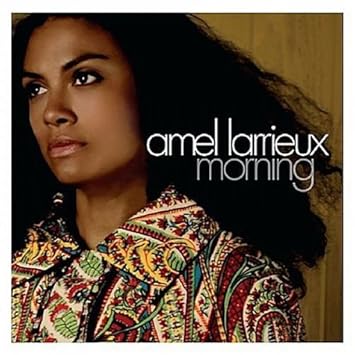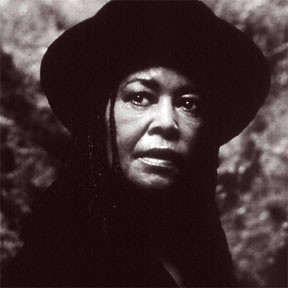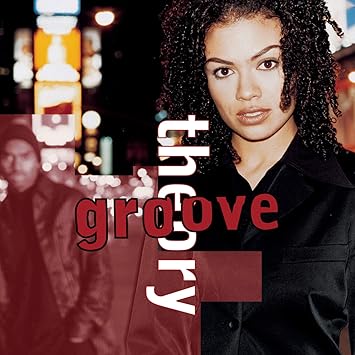Meshell's Moods
Anger can be a great musical catalyst. The story is told about Miles Davis's historic 1964 concert at Lincoln Center, that the band was angry that Miles had preemptively waived their fees for charity. The performance, duly celebrated in two albums, My Funny Valentine and Four and more, can be said to have that urgent yet sinuous edge that make it one of the essential live musical performances. The young rhythm section is especially on fire; you can almost hear the added accents in Tony Williams's percussion, Ron Carter does all the right things as a low end theoretician on the bass, and Herbie Hancock solves differential equations on his piano. And then there's the horns of course, Miles is lyricism itself - the ballads are simply wonderful, and George Coleman blows throughout as if it's a cutting contest. The son of man claimed that man cannot live on bread alone, these hungry musicians tried to come up with a corollary to that notion over the course of the concert. Suffice to say that it was an important occasion for all concerned and the potency of the music endures.
It was in this vein that I listened to Meshell NdegeOcello's band last Friday at The New Parish in Oakland. It wasn't quite anger that was at work, it was more like irritation that was the catalyst but who am I to quibble about the end result. I'll get to the whys, wherefores and textures of their sound but should get the hyperbole off my chest upfront.
Simply put, Meshell NdegeOcello's band is the coldest band since The Revolution circa 1985.If you want a slightly more precise description, I'm referring to the sound and attitude that pertained as the Purple Rain continued to fall, you know, before the addition of horns and the looser feel of the Parade and Sign of the Times bands. I'm talking about a well-oiled band that is out to make a point, a band that wants to share an important moment. Meshell and company are forced to be reckoned with in their live performances, moreover they are touring to support a strong new album, Devil's Halo and are fully committed to its rocky soul aesthetic.
The Wife called them sick - her slang is of a different vintage, for me they were stone cold. Their creative energy harnessed as it was, was something to behold. The sonic architecture brought in elements of Sly Stone, Bootsy Collins, Stanley Clarke and Eddie Hazel. And they were versatile in their approach. Meshell can go from Nathalie Merchant primness to Betty Davis fierceness without skipping a beat and she'll throw in some Sly and Robbie dub for good measure. By the time, they got around to freaking Prince's Dirty Mind, rendering it like no one has heard it before, my jaw had already dropped, I was in awe. When someone is in this kind of mood you can only sing along - and admire.
But on to the bit about anger... As we stood in line outside the club, we overheard mutterings about problems. There were scattered phrases that might cause your average concertgoer to raise their eyebrows, things like "No soundcheck", "Equipment came late", "Damn rental company", "Will they even play?" and so forth. The crowd was suitably wary. They were playing at a new venue, a small club and a suitably intimate joint but one where the kinks were still being worked out. And it showed at the outset even as they came out with such energy. For the first three songs, the sound was slightly off. There were sufficient glitches to cause Meshell to basically throw away the small sound machine (synthesizer/sampler thingimijig) that she's started performing with. Her sound technicians were feeling the pressure as they scrambled to fix things. The underlying tension only heightened the performance. Thus she stuck mostly to singing for the rest of the show and would sing mostly from the more recent parts of her songbook. Call the concert an exercise in aural seduction. Raging songs like Lola, Mass Transit, The Sloganeer - Paradise, and Article 3 were full of urgency. Only occasionally would she pick up the bass when her mood would veer into the ecstatic. Mostly she was orchestrating the shifting soundscapes that now characterize her music; the short outbursts that are the bread and butter of her songcraft only slightly lengthened for the live performance.
There was an element of pride as they paced on stage, as if they all had a point to prove. Oakland may only be a pit stop between the bigger commercial venues - Los Angeles (with the beautiful people) and San Francisco (with the sexy people) where they would play the next night. Oakland however is important for soul singers, functioning as a sort of comfort interlude that restores one's swagger. It's a town that appreciates the ironic mood of a song like White Girl, the audience will laugh in the right places.
Songs like Dead Nigga Blvd - from 2003's Cookie, have extra resonance when sung one block away from Martin Luther King Jnr. Avenue, five minutes away from Mandela Parkway, and 10 minutes away from Malcolm X Elementary School. And she is right to be angry, as expressed in the lyrics and performance of that song, at the disrespect and dysfunctionality of part of the black community in Oakland and elsewhere. People campaigned, marched and sacrificed much labour and even blood to secure the gains of the civil rights struggle, commemorated in those boulevards and yet some would say much is being dissipated. The salty language of the song decries a drive-by mentality accented by the staccato keyboard riffs of the song. The mournful Die Young also struck a chord in that vein. It would figure that only a couple of days later I would read the headline she'd anticipated: Man shot and killed in downtown Oakland. Such is life, or rather such is death in these parts. To die over nothing, a block from the martyr's boulevard...
But back to the considerable songcraft on display. Bitter was her pre-millenium, album length meditation on a mood and we were treated to Fool of Me and Faithful in that key. Fellowship and Forgiveness and Love upped the dub quotient, the reggae tinge of a comfort woman. She took up an acoustic guitar for Crying In Your Beer - lovely balladeering with Chris Bruce her fearless guitarist. Deantoni Parks was ferocious throughout on the drums, sounding like an army platoon. Keefus Ciancia had four or more keyboards and would add ethereal sound effects. She's comfortable having Mark Kelley on bass which is a compliment to his capabilities. All in all this a group with a creative edge. We were treated to a lush musical moment capturing shifting moods.
For the encore, she comes out, picks up her bass and gets into her great remake of Ready for the World's Love you Down. It is spacey, laced with dub stylings, and soulful to the core. It is also flawlessly executed.
Meshell is not one to coddle her audience but she is definitely thankful that we stayed with her on this night. We weren't too demanding for the old favourites and went along with the musical trip of the new songs. Devil's Halo is strong set verging on the rock end of a soul spectrum. You could see the sense of confidence and perhaps a little swagger in the step of all the musicians as they left. In her current thankful mood she is perhaps reaching a sentiment expressed in the title of her second album: Peace beyond Passion.
...
The opening act, Beatropolis, were were a musical puzzle of sorts if only because their feel-good sensibility was hard to pin down. Perhaps we should let them descibe themselves in their own words: "live organic drum and bass... many styles". Indeed there were many styles on display, from an acid jazz start, mix in The Roots circa Organix, a touch of Joycelyn Brown, a smidgen of Roni Size or perhaps Dizzee Rascal and let everything simmer. They would throw in a jungle version of You're All I Need To Get By just because they could, and why ever not, I expect Marvin and Tammi would concur. Perhaps most impressive was Fall Apart. Yeats never would have imagined that a century after writing The Second Coming that we'd have rappers declaiming that "The best lack all conviction, while the worst are full of passionate intensity" to a fierce drum-n-bass beat, a jungle lament about things falling apart, a topic close to my heart. Needless to say, I approve.
...
The full-length video of Meshell's Seattle concert from the following week finds her and band in a more laidback and relaxed mood. Compare to her previous escapades in jazz from a few years ago.
File under: music, soul, rock, funk, review, concert, live, appreciation, mood, virtuosity, MeShell NdegeOcello, toli












